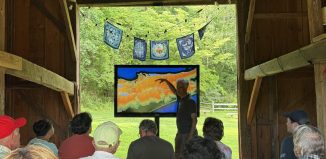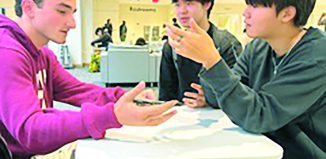Huntington Hospital infectious disease expert discusses latest COVID news
Adrian Popp, chair of Infection Control at Huntington Hospital/ Northwell Health and associate professor of Medicine at Hofstra School of Medicine, spoke with TBR News Media newspapers to discuss vaccinations and COVID-19. Please find below an abridged and edited version of the discussion.
TBR: Why do some people have a stronger reaction to a second shot?
POPP: These two vaccines are very well tolerated. Yes, there are some side effects after getting the shots. Indeed, even in the trials, it has been shown that the second shot is sometimes more prone to have side effects. There is pain, tenderness at the site of the shot. Sometimes people can get fatigue, fever and even a chill. It is rare to have something more severe than that … From my experience, most people tolerate them well, including the second shot.
TBR: Should people try to take at least a day off, if they can, after the second shot?
POPP: That is not necessarily unreasonable. A lot of my colleagues did take the shot later in the afternoon and then go home and rest for the evening. If you can afford to have a day off the next day, that’s probably not unreasonable.
TBR: Does having the vaccine free people up to interact with others?
POPP: What we know from the Moderna and Pfizer trials is that the effectiveness of the vaccination is 95 percent to prevent symptomatic disease … Can a vaccinated person develop a light form [of the disease]? In theory, yes. There are not completely safe in [not] transmitting the disease to someone else.
TBR: Have the Black and brown communities, which have been somewhat resistant to taking the vaccine, been included in the clinical studies?
POPP: Those studies with Pfizer and Moderna included these populations. They are well represented in these studies. There’s no significant difference in the side effects in African Americans, or less efficacy in the Black and brown communities …. [The Black and brown communities] should feel comfortable that it’s as safe or as efficacious as it is in a Caucasian person.
TBR: Have people from the Huntington Hospital or Northwell community asked you about the safety of taking the vaccine?
POPP: I do have conversations like this every day with different members of Huntington Hospital [as well as] the community at large … I bring up one very recent study that will probably help in kind of showing a few things. I’m going to bring in Israel, a smaller country with a centralized health care system that has been very good in vaccinating people …. More than 50 percent of their population has received the COVID vaccination. Specifically, the senior population, 65 and above, has received the vaccine in percentages even higher … In a study in the New England Journal of Medicine of more than 600,000 people who received the vaccine, [they] compared the incidence of COVID without the vaccine. They found the protection is more than 90 percent … That tells us the vaccine is very effective.
TBR: What do you hear about the Johnson & Johnson vaccine?
POPP: The best thing about the [J&J] vaccine is that it’s only one shot and the second thing is that it can be stored at normal temperature compared to the other vaccinations [which require deep freezing] … That allows it to be distributed more easily … It will probably be a good vaccine as well.
TBR: After the shots, what is the immunity?
POPP: After the first shot, approximately a week or two weeks after the first shot, you develop quite a significant level of antibodies. There is a certain amount of protection. With the second shot, the level of antibodies shoots up probably 10 times higher than after the initial shot … Full immunity is one week after you receive the second shot.
TBR: Some reports suggest that people who have COVID and develop antibodies may only need one shot. Is that true?
POPP: There are infectious disease experts looking into this. We do know that after getting COVID, you do develop a certain level of antibodies … That varies widely from person to person … The jury is still out on this one. Truly, we have to look at it in a more scientific way. We’ll find out if this will be an option down the road. At this point, as the recommendation stands, you do have to get both shots, even if you had COVID disease before.
TBR: Do we know more about why one person gets very sick and another has only mild symptoms?
POPP: Up to 50 percent of people who get COVID are either asymptomatic or have really minor symptoms. There are risk factors for developing a serious disease. We know that obesity, hypertension, diabetes and specifically certain immunocompromised conditions are risk factors for more serious disease. I have seen older people in their 90s who do have a mild form of the disease, then I’ve seen somebody in his 40s who has very severe disease … There is no real good way of saying who will develop a more severe disease versus somebody else who will have a milder form.
TBR: What about the aftereffects of COVID?
POPP: I have seen quite a few cases of people who … develop quite severe symptoms. On the milder end, people have a loss of taste and smell. This can last for some time … From my experience, most people will recover from this. On the other hand, people with more severe illness, people who get hospitalized, I have to say that the virus can take a significant toll on that person. I have seen patients who have lost 20 to 40 pounds over a period of a month or a month and a half … Recovering from such a hit of being sick for such a prolonged period of time takes a toll on people. Some patients also develop some degree of cognitive impairment.
TBR: What keeps you up at night?
POPP: Even though [the infection rate] is coming down in New York, it is still not insignificant. It’s still an issue. Until we get … a significant number of our population vaccinated, we’re still going to be in trouble … The only way we can stop the whole thing is by vaccinating as many people as we can.







